 Libri di Sherry Turkle su Unilibro.it) Libri di Sherry Turkle su Unilibro.it)
|
|
2019 |
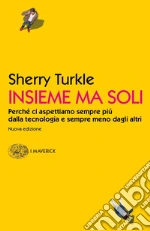 Title :
Insieme ma soli. Perché ci aspettiamo sempre più dalla tecnologia e sempre meno dagli altri
Title :
Insieme ma soli. Perché ci aspettiamo sempre più dalla tecnologia e sempre meno dagli altriAuthor: Turkle Sherry Publisher: Einaudi La vita intima di tutti noi dipende sempre più dalla tecnologia. Navigando sui social, ci illudiamo di far parte di un gruppo di amici, che troviamo a centinaia su Twitter e Facebook, confondendo le miriadi di messaggi con la comunicazione autentica. Ma questa continua connessione produce solo una nuova solitudine. Secondo Sherry Turkle, l'aumento vertiginoso delle nostre interazioni con i supporti tecnologici mette gravemente in crisi le nostre vite emotive. Basato su centinaia di interviste raccolte in anni di ricerche sul campo,Insieme ma soli descrive le recenti, preoccupanti trasformazioni dei rapporti con amici, persone amate, genitori e bambini, e tutta la precarietà delle nostre certezze relative a privacy e comunità, intimità e solitudine. Un libro fondamentale per comprendere in tutta la sua complessità l'impatto psicologico, percettivo e sociale del mondo digitale sulle nostre vite. Con una nuova prefazione alla terza edizione americana. € 26,00
Scontato: € 24,70
|
|
|
1918 |
 Title :
Left to Our Own Devices
Title :
Left to Our Own DevicesAuthor: Morris Margaret E., Turkle Sherry (FRW) Publisher: Zone Books € 22,30
|
 Title :
Left to Our Own Devices
Title :
Left to Our Own DevicesAuthor: Morris Margaret E., Gavin Marguerite (NRT), Turkle Sherry (FRW) Publisher: Tantor Media Inc € 32,30
|
 Title :
Left to Our Own Devices
Title :
Left to Our Own DevicesAuthor: Morris Margaret E., Gavin Marguerite (NRT), Turkle Sherry (FRW) Publisher: Tantor Media Inc € 23,10
|
|
1917 |
 Title :
Alone Together
Title :
Alone TogetherAuthor: Turkle Sherry Publisher: Basic Books € 16,10
|
|
|
1916 |
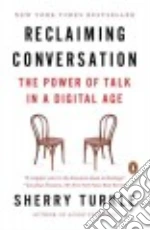 Title :
Reclaiming Conversation
Title :
Reclaiming ConversationAuthor: Turkle Sherry Publisher: Penguin Group USA € 16,10
|
|
|
2016 |
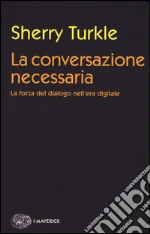 Title :
La conversazione necessaria. La forza del dialogo nell'era digitale
Title :
La conversazione necessaria. La forza del dialogo nell'era digitaleAuthor: Turkle Sherry Publisher: Einaudi Viviamo in un mondo che sempre più sacrifica i piaceri e i benefici della conversazione sull'altare delle tecnologie digitali. Parliamo con un amico, ma nel frattempo diamo più di un'occhiata allo smartphone, e spesso i nostri figli si lagnano se non hanno tra le mani un dispositivo elettronico. Viviamo costantemente in un altrove digitale. Ma per capire chi siamo, per comprendere appieno il mondo che ci circonda, per crescere, per amare ed essere amati, dobbiamo saper conversare. La perdita della capacità di parlare "faccia a faccia" con gli altri - con empatia, imparando nel contempo a sopportare solitudine e inquietudini - rischia di ridurre le nostre capacità di riflessione e concentrazione, portandoci, nei casi estremi, a stati di dissociazione psichica e cognitiva. In questo libro, frutto di anni di interviste e di indagini sul campo, Sherry Turkle, "l'antropologa del cyber-spazio", sottolinea le insidie e gli effetti delle appendici tecnologiche che ci circondano nella società e nella nostra vita quotidiana, per far sì che ognuno ridiventi padrone di se stesso, senza farsene acriticamente dominare. € 26,00
Scontato: € 24,70
|
|
|
1915 |
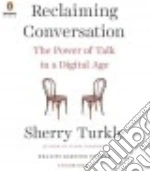 Title :
Reclaiming Conversation (CD Audiobook)
Title :
Reclaiming Conversation (CD Audiobook)Author: Turkle Sherry, Potter Kirsten (NRT) Publisher: Penguin Group USA € 42,10
|
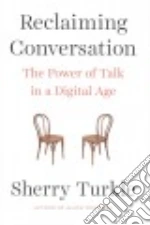 Title :
Reclaiming Conversation
Title :
Reclaiming ConversationAuthor: Turkle Sherry Publisher: Penguin Pr Renowned media scholar Sherry Turkle investigates how a flight from conversation undermines our relationships, creativity, and productivity—and why reclaiming face-to-face conversation can help us regain lost ground. We live in a technological universe in which we are always communicating. And yet we have sacrificed conversation for mere connection. € 23,80
|
 Title :
Reclaiming Conversation
Title :
Reclaiming ConversationAuthor: Sherry Turkle Publisher: TURNAROUND PUBLISHER SERVICES € 17,80
|
|
1912 |
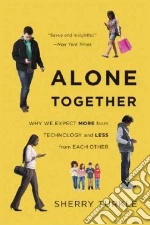 Title :
Alone Together
Title :
Alone TogetherAuthor: Turkle Sherry Publisher: Basic Books In this final volume in a trilogy of works on computers and people that includes The Second Self and Life on the Screen, Turkle (social studies of science, M.I.T.), presents an important exploration of the psychological effects of computers on decision making and relationship building in a culture increasingly filled with technology dependence and social networking. Based on fifteen years of research and numerous interviews with adults and children, the work explores the development of new types of relationships among families and peer groups that are moderated by technology, the quality and psychological health of these relationships and a growing reaction to, and rejection of, this new cultural norm. This is a paperbound reprint of the 2011 clothbound edition. Annotation ©2012 Book News, Inc., Portland, OR (booknews.com) € 16,60
|
|
|
1911 |
 Title :
Evocative Objects
Title :
Evocative ObjectsAuthor: Turkle Sherry (EDT) Publisher: Mit Pr For Sherry Turkle, "We think with the objects we love; we love the objects we think with." In Evocative Objects, Turkle collects writings by scientists, humanists, artists, and designers that trace the power of everyday things. These essays reveal objects as emotional and intellectual companions that anchor memory, sustain relationships, and provoke new ideas.These days, scholars show new interest in the importance of the concrete. This volume's special contribution is its focus on everyday riches: the simplest of objects--an apple, a datebook, a laptop computer--are shown to bring philosophy down to earth. The poet contends, "No ideas but in things." The notion of evocative objects goes further: objects carry both ideas and passions. In our relations to things, thought and feeling are inseparable.Whether it's a student's beloved 1964 Ford Falcon (left behind for a station wagon and motherhood), or a cello that inspires a meditation on fatherhood, the intimate objects in this collection are used to reflect on larger themes--the role of objects in design and play, discipline and desire, history and exchange, mourning and memory, transition and passage, meditation and new vision.In the interest of enriching these connections, Turkle pairs each autobiographical essay with a text from philosophy, history, literature, or theory, creating juxtapositions at once playful and profound. So we have Howard Gardner's keyboards and Lev Vygotsky's hobbyhorses; William Mitchell's Melbourne train and Roland Barthes' pleasures of text; Joseph Cevetello's glucometer and Donna Haraway's cyborgs. Each essay is framed by images that are themselves evocative. Essays by Turkle begin and end the collection, inviting us to look more closely at the everyday objects of our lives, the familiar objects that drive our routines, hold our affections, and open out our world in unexpected ways. € 17,90
|
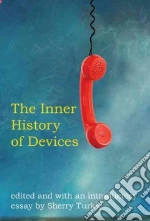 Title :
The Inner History of Devices
Title :
The Inner History of DevicesAuthor: Turkle Sherry (EDT) Publisher: Mit Pr For more than two decades, in such landmark studies as The Second Self and Life on the Screen, Sherry Turkle has challenged our collective imagination with her insights about how technology enters our private worlds. In The Inner History of Devices, she describes her process, an approach that reveals how what we make is woven into our ways of seeing ourselves. She brings together three traditions of listening--that of the memoirist, the clinician, and the ethnographer. Each informs the others to compose an inner history of devices. We read about objects ranging from cell phones and video poker to prosthetic eyes, from Web sites and television to dialysis machines. In an introductory essay, Turkle makes the case for an "intimate ethnography" that challenges conventional wisdom. One personal computer owner tells Turkle: "This computer means everything to me. It's where I put my hope." Turkle explains that she began that conversation thinking she would learn how people put computers to work. By its end, her question has changed: "What was there about personal computers that offered such deep connection? What did a computer have that offered hope?" The Inner History of Devices teaches us to listen for the answer. In the memoirs, ethnographies, and clinical cases collected in this volume, we read about an American student who comes to terms with her conflicting identities as she contemplates a cell phone she used in Japan ("Tokyo sat trapped inside it"); a troubled patient who uses email both to criticize her therapist and to be reassured by her; a compulsive gambler who does not want to win steadily at video poker because a pattern of losing and winning keeps her more connected to the body of the machine. In these writings, we hear untold stories. We learn that received wisdom never goes far enough. € 17,90
|
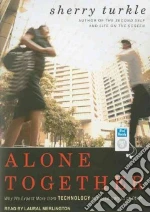 Title :
Alone Together
Title :
Alone TogetherAuthor: Turkle Sherry, Merlington Laural (NRT) Publisher: Tantor Media Inc Consider Facebook-it's human contact, only easier to engage with and easier to avoid. Developing technology promises closeness. Sometimes it delivers, but much of our modern life leaves us less connected with people and more connected to simulations of them.In Alone Together, MIT technology and society professor Sherry Turkle explores the power of our new tools and toys to dramatically alter our social lives. It's a nuanced exploration of what we are looking for-and sacrificing-in a world of electronic companions and social networking tools, and an argument that, despite the hand-waving of today's self-described prophets of the future, it will be the next generation who will chart the path between isolation and connectivity. € 26,80
|
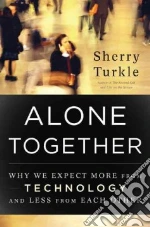 Title :
Alone Together
Title :
Alone TogetherAuthor: Turkle Sherry Publisher: Perseus Books Group Consider Facebook—it’s human contact, only easier to engage with and easier to avoid. Developing technology promises closeness. Sometimes it delivers, but much of our modern life leaves us less connected with people and more connected to simulations of them. In Alone Together, MIT technology and society professor Sherry Turkle explores the power of our new tools and toys to dramatically alter our social lives. It’s a nuanced exploration of what we are looking for—and sacrificing—in a world of electronic companions and social networking tools, and an argument that, despite the hand-waving of today’s self-described prophets of the future, it will be the next generation who will chart the path between isolation and connectivity. € 23,50
|
||
|
2011 |
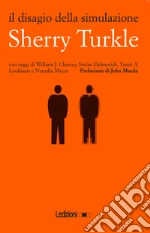 Title :
Il disagio della simulazione
Title :
Il disagio della simulazioneAuthor: Turkle Sherry Publisher: Ledizioni "Negli ultimi vent'anni le tecnologie per la simulazione e la visualizzazione hanno cambiato il nostro modo di rapportarci con il mondo. In "Il disagio della simulazione", Sherry Turkle esplora gli aspetti di questo cambiamento epocale: studenti di architettura che non disegnano più a mano, scienziati e ingegneri che ammettono che le simulazione al computer sembrano più reali degli esperimenti nei laboratori.La simulazione richiede che ci si immerga nel suo mondo, ed i benefici sono chiari: gli architetti possono creare edifici impensabili prima, gli scienziati manipolano la struttura delle molecole in uno spazio virtuale, i medici imparano l'anatomia su corpi umani digitali. Ma una volta immersi siamo più vulnerabili. Ci sono pro e contro. Gli scienziati più anziani descrivono i giovani come "ebbri di codice", mentre i giovani cercano in tutti i modi di carpire la conoscenza tacita dei più anziani. Da entrambe le parti si avverte il divario generazionale: c'è il timore che con la simulazione qualcosa sfugga per sempre." (Sherry Turkle) € 22,00
Scontato: € 20,90
|
|
|
2009 |
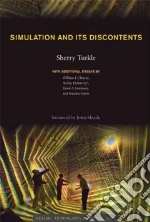 Title :
Simulation and Its Discontents
Title :
Simulation and Its DiscontentsAuthor: Turkle Sherry, Clancey William J. (CON), Helmreich Stefan (CON), Loukissas Yanni A. (CON) Publisher: Mit Pr Over the past twenty years, the technologies of simulation and visualization have changed our ways of looking at the world. In Simulation and Its Discontents, Sherry Turkle examines the now dominant medium of our working lives and finds that simulation has become its own sensibility. We hear it in Turkle's description of architecture students who no longer design with a pencil, of science and engineering students who admit that computer models seem more "real" than experiments in physical laboratories. Echoing architect Louis Kahn's famous question, "What does a brick want?", Turkle asks, "What does simulation want?" Simulations want, even demand, immersion, and the benefits are clear. Architects create buildings unimaginable before virtual design; scientists determine the structure of molecules by manipulating them in virtual space; physicians practice anatomy on digitized humans. But immersed in simulation, we are vulnerable. There are losses as well as gains. Older scientists describe a younger generation as "drunk with code." Young scientists, engineers, and designers, full citizens of the virtual, scramble to capture their mentors' tacit knowledge of buildings and bodies. From both sides of a generational divide, there is anxiety that in simulation, something important is slipping away. Turkle's examination of simulation over the past twenty years is followed by four in-depth investigations of contemporary simulation culture: space exploration, oceanography, architecture, and biology. € 26,80
|
 Title :
La vita nascosta degli oggetti tecnologici
Title :
La vita nascosta degli oggetti tecnologiciAuthor: Turkle Sherry; Cavalli N. (cur.) Publisher: Ledizioni Grazie ad un approccio interdisciplinare che spazia dalla psicoanalisi alla sociologia ed all'etnografia, Sherry Turkle e gli altri autori ci aiutano a capire come la tecnologia crei la nostra identità, per arrivare a domandarci quali sono i veri scopi ed i veri utilizzi degli oggetti tecnologici; dai cellulari ai defribrillatori, questo libro racconta la storia segreta di oggetti che fanno ormai parte integrante di noi e della società in cui viviamo. € 22,00
Scontato: € 20,90
|
|
2005 |
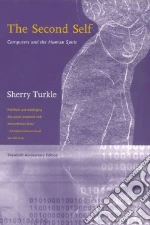 Title :
The Second Self
Title :
The Second SelfAuthor: Turkle Sherry Publisher: Mit Pr In The Second Self, Sherry Turkle looks at the computer not as a "tool," but as part of our social and psychological lives; she looks beyond how we use computer games and spreadsheets to explore how the computer affects our awareness of ourselves, of one another, and of our relationship with the world. "Technology," she writes, "catalyzes changes not only in what we do but in how we think." First published in 1984, The Second Self is still essential reading as a primer in the psychology of computation. This twentieth anniversary edition allows us to reconsider two decades of computer culture—to (re)experience what was and is most novel in our new media culture and to view our own contemporary relationship with technology with fresh eyes. Turkle frames this classic work with a new introduction, a new epilogue, and extensive notes added to the original text. Turkle talks to children, college students, engineers, AI scientists, hackers, and personal computer owners—people confronting machines that seem to think and at the same time suggest a new way for us to think—about human thought, emotion, memory, and understanding. Her interviews reveal that we experience computers as being on the border between inanimate and animate, as both an extension of the self and part of the external world. Their special place betwixt and between traditional categories is part of what makes them compelling and evocative. (In the introduction to this edition, Turkle quotes a PDA user as saying, "When my Palm crashed, it was like a death. I thought I had lost my mind.") Why we think of the workings of a machine in psychological terms—how this happens, and what it means for all of us—is the ever more timely subject of The Second Self. € 34,20
|
 Title :
La vita sullo schermo
Title :
La vita sullo schermoAuthor: Turkle Sherry Publisher: Apogeo Education La vita reale e quella sullo schermo sono veramente mondi separati e distinti? Quale influenza ha il rapporto con la macchina sul nostro modo di pensare riguardo l'evoluzione, le relazioni, la politica, il sesso, noi stessi? In quasi vent'anni di ricerche sul campo, Sherry Turkle ha osservato e partecipato a incontri fra persone e computer, ha discusso con molti le loro esperienze nell'uso della macchina e, in un certo senso, ha interrogato il computer stesso. Ne esce il racconto di come il nostro rapporto con il computer stia modificando la nostra mente e i nostri cuori. Esplorazione della nuova cultura della simulazione e dei confini fra umano e tecnologico, il libro è una sintesi di analisi culturale, di introspezione psicanalitica e delle attuali conoscenze su computer e comunicazioni. € 18,00
|
|
1997 |
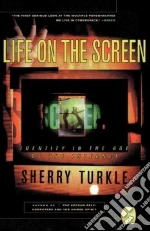 Title :
Life on the Screen
Title :
Life on the ScreenAuthor: Turkle Sherry Publisher: Simon & Schuster Life on the Screenis a book not about computers, but about people and how computers are causing us to reevaluate our identities in the age of the Internet. We are using life on the screen to engage in new ways of thinking about evolution, relationships, politics, sex, and the self. Life on the Screen traces a set of boundary negotiations, telling the story of the changing impact of the computer on our psychological lives and our evolving ideas about minds, bodies, and machines. What is emerging, Turkle says, is a new sense of identity-- as decentered and multiple. She describes trends in computer design, in artificial intelligence, and in people's experiences of virtual environments that confirm a dramatic shift in our notions of self, other, machine, and world. The computer emerges as an object that brings postmodernism down to earth. € 20,10
|
|